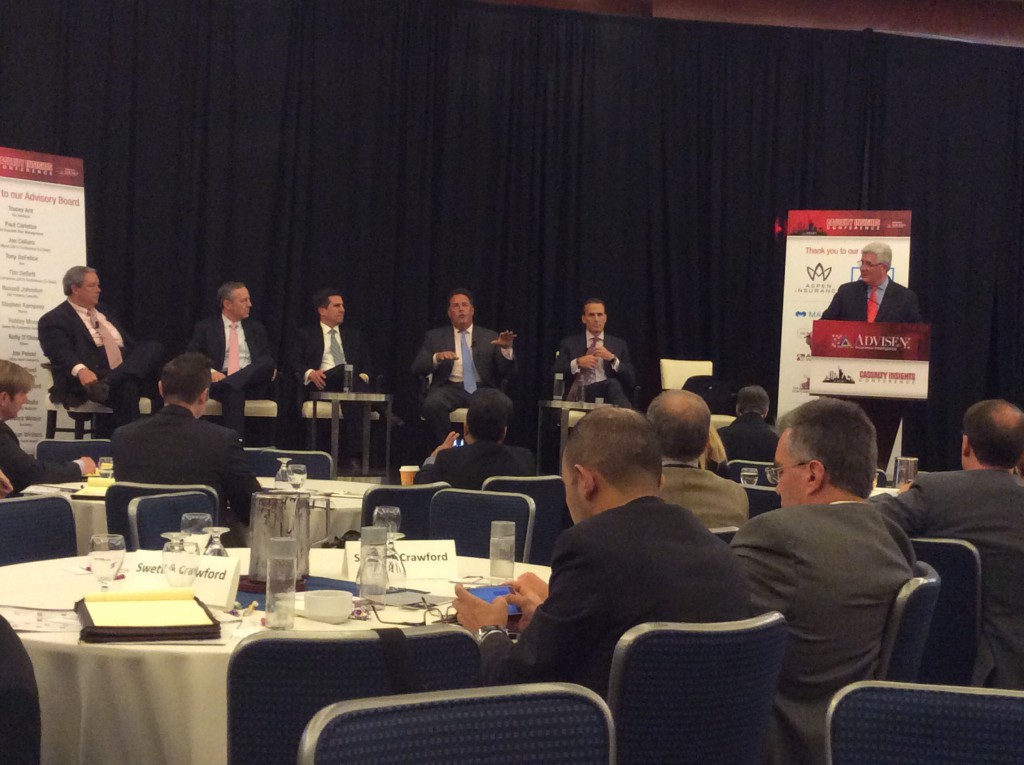A View from the Top – Top casualty execs give their views on a variety of issues
The closing session at the 2015 Advisen Casualty Insights Conference was the executive panel consisting of Tony DeFelice – AON (moderator), Mark Butler – Liberty Mutual, John Doyle – AIG, Chris Maleno – ACE, Andrew Marcell – Guy Carpenter, and Glenn Spencer – Lockton. This session was a question/answer format.
Question: What is driving reserve releases in the casualty industry? Answer: Carriers have been more disciplined in their pricing the last few years which has boosted surpluses.
Question: The fed is poised to raise interest rates. Since inadequate interest rates have been a factor in the need for increased premiums what impact will rising interest rates have on premiums? Answer: Interest rates are a component in pricing but not the only component. Rising interest rates could have an impact on pricing but that depends on what happens with the other factors.
Question: How are data and analytics impacting the way you do business and is this replacing human decisions? Answer: Analytics and data are an important component in the decision making process. This is not replacing human decisions, but it allows us to make more informed and better decisions.
Question: Alternative capital has been entrenched in the property market. Will we see this in the casualty market? Answer: It depends on your definition of alternative capital which could include pension funds and hedge funds. In some ways, this is already in the casualty marketplace. One thing that will hold back these investments is the long tail nature of some casualty lines. Alternative capital tends to prefer the short-tail lines where the return on investment becomes clear much quicker.
Question: TRIA was just reauthorized. Was this a significant event for our industry or would a backstop around Nuclear, Chemical, Biological, Radiological be sufficient? Answer: Buyers purchase this coverage because it is affordable and there is perceived risk. One issue with reauthoization was that the coverage was required under many property financing contracts so if the coverage lapsed those people would technically be in default of a loan condition. Most large carriers can absorb the property and liability exposures associated with terrorism risks, but the unlimited nature of workers’ compensation coverage made TRIA necessary for that line. While NCBR coverage may be sufficient, you just never know what other risks may develop so having a known peril coverage only may not be enough.
Question: As property rates have been declining, have carriers looked to shift capital to the casualty lines? Answer: That is not the case. The decrease in property rates has been largely driven by the lack of large catastrophic property losses. Property is seen as a much more stable and profitable line from a pricing standpoint than casualty, especially due to the long tail of casualty.
Question: Do you think there will be significant M&A activity in the insurance marketplace due to the significant capital out there? Answer: This has been going on for years when it creates value for the shareholders of both companies. There is no expectation there will be a significant increase in this activity.
Question: Given the direction of the market how will the role of brokers evolve? Answer: Brokers provide service, and execute transactions. The service piece will become increasingly important when there is less pricing push on the transactions.
Question: From the casualty perspective what keeps you up at night? Answers:
- Unknown and emerging risks. We don’t know what type of losses we will be seeing in 10-15 years.
- Concerns that the market will maintain underwriting discipline.
- Concerns around potential regulatory changes.
- Concerns over the courts interpreting your policy in unintended ways.
Question: How do we attract new talent to our industry? Answers: With the variety of institutions offering degrees in risk management young people today are more prepared to enter our industry than ever before. There is a wide variety of well-paying jobs in our industry which is getting the attention of college graduates.


